Project events
On this page
- WastPan researchers at the conference Towards a Global Wastewater Surveillance System for Public Health and Town Hall X coordinated by the European Commission Research Centre in Frankfurt, Germany, 16–17 November 2023
- The final seminar of the WastPan project was organized at THL Tilkanmäki in Helsinki on 26 October 2023 as a hybrid meeting
- Members of the WastPan consortium cooperate in the UN water commitment given by THL
- WastPan researchers at the Health-related Water Microbiology (WATERMICRO23) symposium in Darwin, Australia, 4-9 June 2023
- WastPan stakeholder meeting for healthcare professionals was organized on May 17, 2023
- WastPan project at the Water Supply Days 2023 event in Jyväskylä 10-11 May 2023
- WastPan presented at the EU4S Town Hall meeting on 15-16 March 2023
- WastPan-researchers gathered at the consortium meeting in Tampere 13-14 March 2023
- WastPan mid-way webinar was held 24th November 2022
- The WastPan consortium participated in the World One Health Congress in November 2022
- The WastPan consortium participated in the international water sector meeting in Copenhagen
- The second research year of the WastPan project is underway
- WastPan researchers in 2nd consortium meeting in December 2021
- WastPan project presented in 6th EU Town Hall meeting in November 2021
- EU Sewage Sentinel System for SARS-CoV-2 (EU4S) – V Town Hall Meeting and e-Exhibition, EU SCIENCE HUB
- WastPan stakeholder meetings with public health care actors (16 June 2021) and wastewater treatment plant representatives (18 June 2021)
- WastPan consortium’s spring meeting was held on World Water Day 22 March 2021
WastPan researchers at the conference Towards a Global Wastewater Surveillance System for Public Health and Town Hall X coordinated by the European Commission Research Centre in Frankfurt, Germany, 16–17 November 2023
The tenth consecutive but the first on-site TOWN HALL X wastewater epidemic monitoring conference was held in mid-November 2023 in Frankfurt, Germany. The research conducted by the WastPan project gained visibility at the conference, as we were able to present the project's newly completed results website. The presentation by Sami Oikarinen, leader of the consortium sub-project, and Kirsi-Maarit Lehto, leader of the work package, was titled "WBS Data Sharing on Multiple Pathogens through the WastPan Portal in Finland - Influenza A and RSV as Pilot Viruses". Lehto gave this speech at the conference, and also her poster and ePoster titled "WastPan Portal Development for Multiple Pathogens in Finland" presented the wastewater monitoring portal developed during the project, with influenza A and RS viruses acting as the pilot microbes of the portal. The leader of the consortium's sub-project, Annamari Heikinheimo from the University of Helsinki, gave a poster presentation on the results of antibiotic resistance monitoring at the conference under the title "Approaches to AMR Surveillance from wastewater – isolation of Carbapenemase-producing bacteria”. WastPan project members, Tarja Pitkänen, director of the WastPan consortium, and researcher Aleksi Kolehmainen from THL, also participated in the event.
TOWN HALL X – Wastewater Witchers and Watchers was part of the international conference "Towards a Global Wastewater Surveillance System for Public Health", jointly organized by the European Commission (DG HERA and JRC), the Bill & Melinda Gates Foundation, the German Ministry of Health and the State of Hesse and its development agency Hessen-Trade-and-Invest (HTAI), which also co-hosted the event. JRC and the University of California, Merced, co-chaired the tenth Town Hall event.
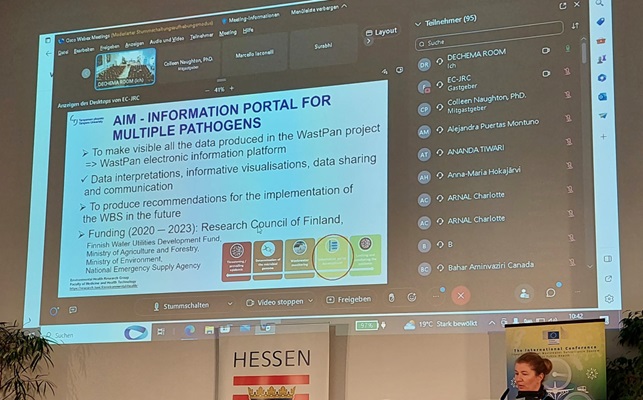
Photo: Sami Oikarinen.
The final seminar of the WastPan project was organized at THL Tilkanmäki in Helsinki on 26 October 2023 as a hybrid meeting
There were 173 people registered for the event from 32 countries. Around 40 participants were on-site, and more than 80 attended remotely. The WastPan results website was launched at the seminar and the event included the respiratory virus and AMR results presented by WastPan researchers. Additionally, there were insights and comments from external experts and stakeholders.
WastPan consortium leader, Tarja Pitkänen, Chief Specialist and Assoc. Prof. from the Finnish Institute for Health and Welfare (THL) and University of Helsinki welcomed the participants to the event and briefly introduWastPan consortium leader, Tarja Pitkänen, Chief Specialist and Assoc. Prof. from the Finnish Institute for Health and Welfare (THL) and University of Helsinki welcomed the participants to the event and briefly introduced the WastPan project. Tampere University’s Project Manager, Kirsi-Maarit Lehto, and a THL’s statistician Oskari Luomala presented the newly completed WastPan results website. The WastPan researchers presented the main findings, conclusions, and lessons learned from WastPan about multi-pathogen wastewater-based surveillance (WBS). In a session titled “Impact of the wastewater-based surveillance to society”, THL’s senior researcher Ananda Tiwari shared his views on the “Requirements and further research needs for building an efficient wastewater-based surveillance programs – Take home messages from WastPan” and Professor Amy Pruden from Virginia Polytechnic Institute and State University, USA, gave insights on “The use and development of wastewater-based epidemiology in the future”. Additionally, expert and stakeholder comments were heard from Tuija Leino, Chief Physician at THL; Ari Kangas, Senior Ministerial Adviser, Ministry of the Environment, Finland; and Anastasia Koutsolioutsou, the Head of Environmental Health Office, co-coordinator of Joint Action EU-WISH, National Public Health Organization of Greece.
After the event, we collected anonymous feedback on the usability of the results website and the final seminar. We aim to use the views obtained from the survey to support our future development work. We received nine responses to the feedback survey, and the majority of respondents were researchers. All respondents had familiarized themselves with the results website and participated in the final seminar. The design of the portal was perceived as its best aspect, with content, usability and clarity coming next, in that order. The likelihood of recommending the WastPan portal website to a colleague scored an average of 8.1/10. Regarding how useful the final seminar event was, the average score was 8.6/10.
Warm thanks to everyone who participated in the event and survey. Let's continue the development work together!
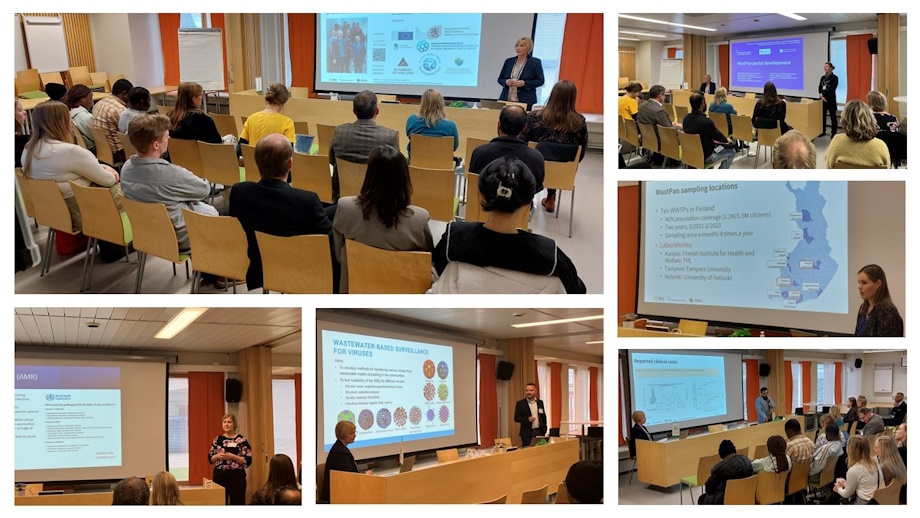
Photos: Oskari Luomala and Teemu Möttönen
Members of the WastPan consortium cooperate in the UN water commitment given by THL
THL has registered a UN water commitment in which it commits itself to raising awareness of waterborne pathogens, such as Cryptosporidium and Giardia, and their prevention. The aim is to promote water safety and the human rights related to clean water and sanitation. The UN water commitment was made in cooperation with the members of the WastPan consortium and the Ministry of Social Affairs and Health.
More information:
UN water commitment registered by THL
WastPan researchers at the Health-related Water Microbiology (WATERMICRO23) symposium in Darwin, Australia, 4-9 June 2023
The twenty-first Health-related Water Microbiology conference of water microbiologists was organized at the beginning of June 2023 in Darwin on the northernmost tip of Australia. The research of the WastPan project was prominently represented in the wastewater monitoring session of this international research symposium.
WastPan consortium leader Tarja Pitkänen's speech was titled "Developing wastewater-based Pandemic preparedness for multiple pathogens - WASTPAN", and it talked about the experiences gained during the project in the development of wastewater monitoring. Consortium's sub-project leader Sami Oikarinen's presentation and poster showcased the influenza and RS virus results produced in the project under the title "Municipal wastewater reveals up-to-date information on viruses affecting public health". The leader of the consortium's work package, Anssi Lipponen, talked about the identification of coronavirus variants in wastewater under the title "Detection of SARS-CoV-2 variants and their proportions in wastewater samples by next generation sequencing in Finland". Doctoral researcher Anniina Sarekoski had a poster presentation at the conference about the results from the WastPan data under the title "Wastewater-based Epidemiology uncovers Trends of waterborne pathogens and Antimicrobial resistance prevalence in Finland". Senior researcher Ananda Tiwari presented wastewater-based antibiotic resistance monitoring in his poster "Wastewater Surveillance of Antibiotic-Resistant bacterial pathogens at a population level".
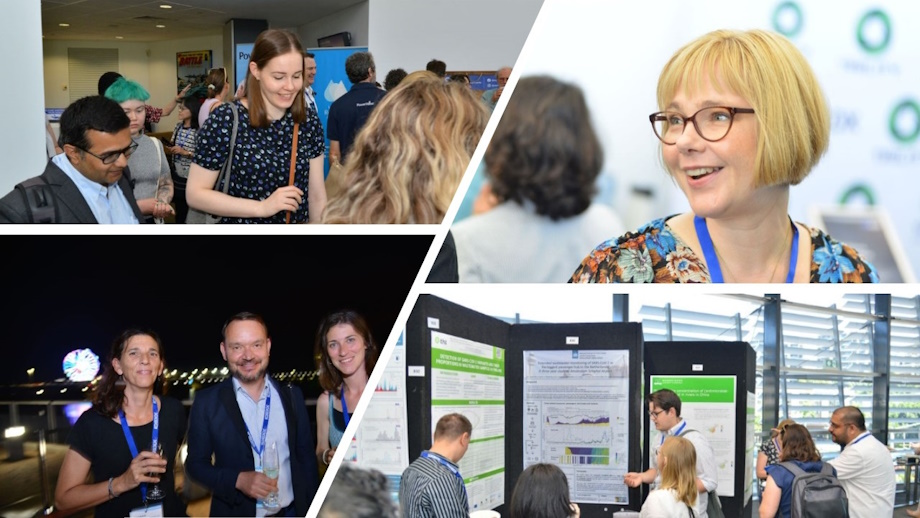
Moods from the Darwin conference. In the photos, Tarja Pitkänen, Ananda Tiwari, Anniina Sarekoski, Anssi Lipponen, and Sami Oikarinen together with Silvia Bofill-Mass and Marta Rusinol (Photos WaterMicro23 Event Manager).
WastPan stakeholder meeting for healthcare professionals was organized on May 17, 2023
WastPan organized a stakeholder meeting for healthcare professionals on May 17, 2023 as a remote meeting. There was a total of fifty participants in the two-hour meeting. The meeting included Respiratory virus, AMR and Future sessions with introductions and panel discussions.
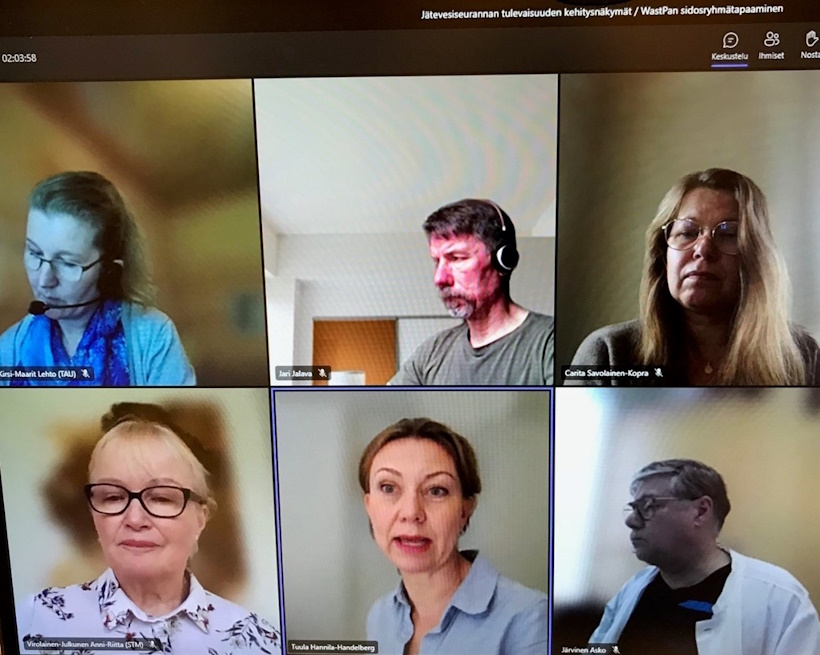
The panel discussion "Future development perspectives of wastewater monitoring" was moderated by Kirsi-Maarit Lehto and the panelists were Jari Jalava, Carita Savolainen-Kopra, Anni-Riitta Virolainen-Julkunen, Tuula Hannila Handelberg and Asko Järvinen. Panelists Janne Laine and Veli-Jukka Anttila and event moderators Annamari Heikinheimo, Sami Oikarinen and Tarja Pitkänen are missing from the picture.
The participants of the event had a positive attitude towards the development of wastewater monitoring and saw a lot of development prospects in the procedure. The panels showed that the results of wastewater monitoring had been used in the work regarding viruses, although challenges had been identified with the method and the interpretation of the results, especially with regard to the coronavirus. The following viruses were recommended for monitoring: SARS-CoV-2 coronavirus, influenza, RSV and enteroviruses, as well as NGS methodology for new threats. It was concluded that more analysis and development is still needed.
Regarding antimicrobial resistance, it was stated that we are only at the stage of scientific research, and the results have not yet been really utilized. The methodology is still partly undeveloped. There is a need for population-level monitoring (geographical coverage vs. hospitals), as well as monitoring of selected priorities (such as CPE, C. auris, VRE). In general, additional information would be needed on what is a normal level and what is abnormal.
When developing a monitoring system, new and old threats must be considered, and it is also necessary to think about the chemical side and, for example, monitoring the consumption of antimicrobials. Wastewater-based illicit drug monitoring is already well developed. Special attention is needed to the regional distribution of diseases and antimicrobial resistance. Considering the world situation, it may also be necessary to monitor diseases that have previously disappeared. Goals for wastewater monitoring are also being set at the EU level, and the produced research results should gladly benefit this legislative preparation. One thing to consider is the ethics of wastewater monitoring.
Regarding the distribution channels of wastewater monitoring results, the current way of distributing the results on THL's website openly to everyone was particularly preferred. It was hoped that interpretation of results and consideration of areas would be included. Graphical trend monitoring has proven to be a functional presentation method. At the end of the event, the participants were invited to the final seminar of WastPa on Thursday, October 26, 2023 in Helsinki. The event is aimed at the scientific and expert community and is held in English.
WastPan project at the Water Supply Days 2023 event in Jyväskylä 10-11 May 2023
The Vesihuolto 2023 days organized by the Water Works Association (VVY) were organized in Jyväskylä Paviljonki on 10-11 May 2023. The WastPan consortium was represented at the event by Tarja Pitkänen and Sami Oikarinen with speech entitled "Establishment of wastewater monitoring as an observation tool for monitoring infectious diseases in Finland" in the Wastewater I session led by Paula Lindell from VVY.
WastPan presented at the EU4S Town Hall meeting on 15-16 March 2023
Sami Oikarinen and Anssi Lipponen presented the WastPan project at the 9th EU4S Town Hall event on March 16, 2023. In their presentation "Wastewater-based surveillance applied for the monitoring trends in the prevalence of multiple microbes", the list of wastewater treatment plants and target microbes monitored in the WastPan project and the basic principles of the national wastewater monitoring program planned based on this were presented.
The recording of the event is available from
WastPan-researchers gathered at the consortium meeting in Tampere 13-14 March 2023
The second live meeting of the WastPan-project was organized in the Arvo-building of the Tampere University's Kauppi campus in mid-March. The two-day event began with presentations by the Virology research group and the Faculty of Medicine and Health Technology by the dean. Collaborators from THL and the University of Helsinki also got to see the virology laboratory facilities and the Arvo Farmi deep-freeze sample storage. Otherwise, the program included, among other things, the presentation of the project's results, the planning of future events and occasions, and the publication of the results. The researchers of the project also got to know the history of Tampere and the most significant landmarks as part of a sightseeing tour of Tampere.
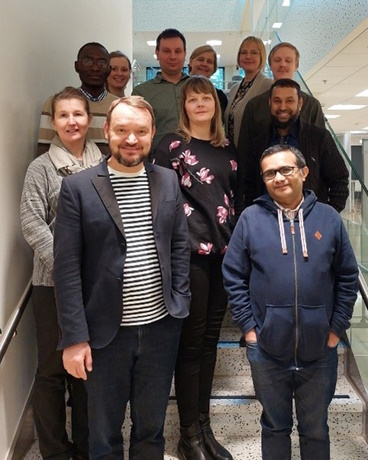
The participants of the WastPan Tampere consortium meeting on March 13-14, 2023 (back from left): Viivi Heljanko, Annamari Heikinheimo, Tarja Pitkänen, Ahmad Al-Mustapha, Anssi Lipponen, Oskari Luomala, Kirsi-Maarit Lehto, Anna-Maria Hokajärvi, Rafiqul Hyder, Sami Oikarinen and Ananda Tiwari.
WastPan mid-way webinar was held 24th November 2022
The WastPan mid-Way seminar was held on November 24, 2022 as a webinar open to everyone. In the webinar, we heard about wastewater monitoring and its future prospects in Europe, as an invited speech was given by Bernd Gawlik from EU Commission. He talked about the EU's wastewater monitoring and future prospects. The seminar audience also heard about wastewater monitoring in the Netherlands in a speech by Willemijn Lodder from the Netherlands Institute for Public Health and the Environment (RIVM). The mid-term results of the WastPan project were presented in speeches by WastPan researchers from the National Institute of Health and Welfare, the University of Tampere and the University of Helsinki regarding the development of the WastPan portal and the demonstration of various pathogens and antimicrobial resistance during the WastPan project at ten different Finnish wastewater treatment plants. The WastPan project will continue until the end of November 2023, when a closing seminar will be held on the project.
The program of the mid-way webinar (pdf, 309 kb)
.png/54e8d1e6-779e-bd6b-be68-7171fb09e346?t=1681449721322)
The WastPan mid-term seminar was held as a webinar open to everyone (Photographer: Annamari Heikinheimo)
The WastPan consortium participated in the World One Health Congress in November 2022
The World One Health Congress (WOHC) is a global congress organized every few years, which is attended by a multidisciplinary group of One Health researchers from different countries. This year, the congress was organized in Singapore and the focus of the meeting was in 1) One Health science, 2) Antimicrobial Resistance, 3) Policy, Environment, and Biosecurity, 4) Pandemic Preparedness and Health System Resilience, and 5) Impact on and Innovations in Clinical Medicine. The congress is popular not only among researchers but also among authorities, companies and the Third sector. One Health – the common health of people, animals and the environment is understood as an important approach in combating future global challenges such as pandemics. WastPan researcher Viivi Heljanko, a doctoral student at the University of Helsinki, presented results related to the monitoring of antimicrobial resistance in wastewater at the congress (Figure).
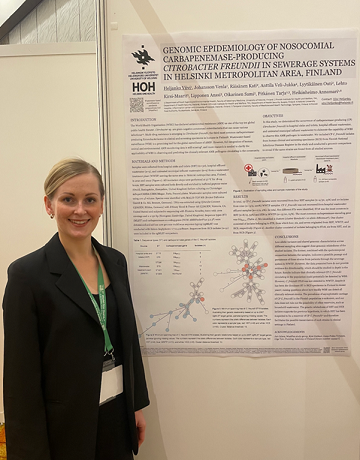
University of Helsinki doctoral student Viivi Heljanko presenting the results of the WastPan project at the World One Health congress in Singapore in November 2022 (photographer Annamari Heikinheimo).
The WastPan consortium participated in the international water sector meeting in Copenhagen
The IWA World Water Congress & Exhibition is a global event for water professionals. This year, the congress was organized for the first time in the Nordic countries in Copenhagen on the 11th-15th September 2022. The main focuses of the meeting were the digital economy, smart and livable cities, utilization of innovations, adaptation to climate change, community engagement and sustainable development.
Before the actual meeting in Copenhagen, a side event was organized in Helsinki, which was attended by Finnish and international meeting guests. The event was held at the Viikinmäki wastewater treatment plant. The day included a tour of the treatment plant and also presentations from Finnish water industry operators. Adjunct professor Sami Oikarinen from the Tampere University presented the WastPan project and virus results from the project.
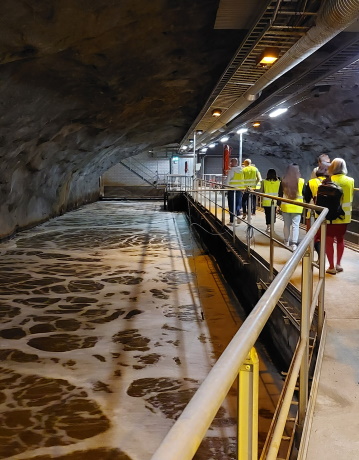
Guests of IWA's Helsinki side event on tour at Viikinmäki wastewater treatment plant.
The participants of the IWA congress submitted almost 2,000 presentations, which were peer-reviewed by a panel of water industry professionals. The final meeting program was very extensive and included approximately 350 oral presentations, 600 poster presentations and 65 workshops and training sessions.
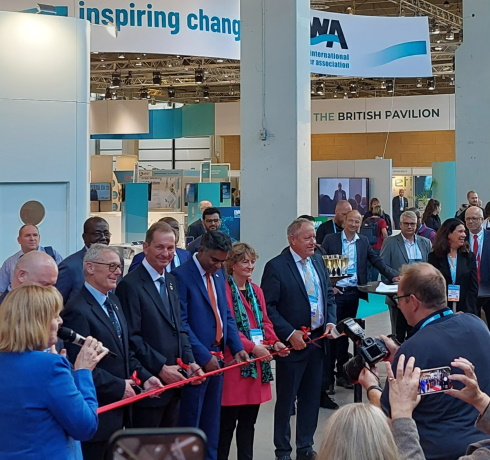
The IWA exhibition was officially opened by ceremony of cutting the red ribbon.
The WastPan consortium made a strong contribution to the meeting. The consortium gained international visibility, as Sami Oikarinen gave a presentation on the topic: "Wastewater-based virus monitoring as a pandemic preparedness tool – WastPan sub-project". In addition, the meeting also featured poster presentations by Annastiina Rytkösen from the University of Helsinki and Anna-Maria Hokajärvi from THL. The IWA meeting was very interesting and enabled networking with international actors.
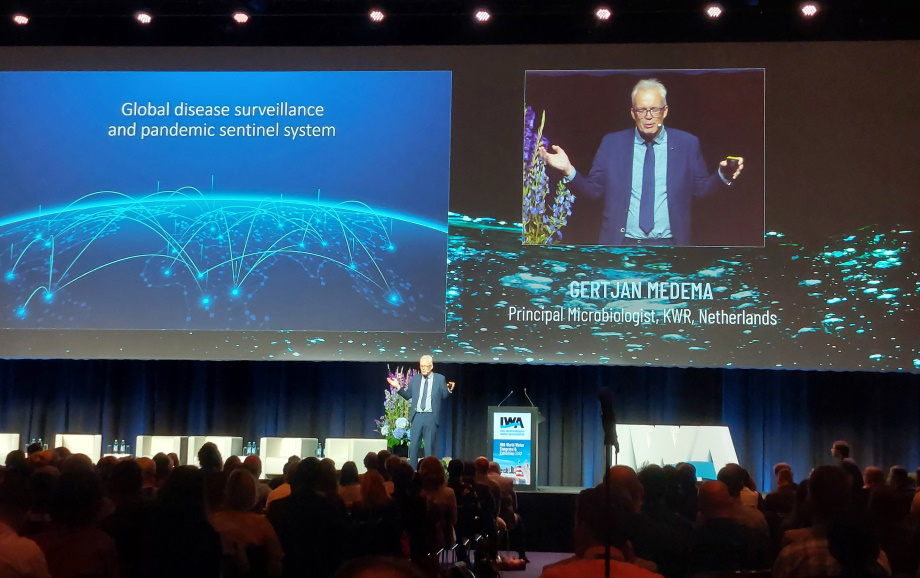
One of the keynote speakers of the meeting was Professor Gertjan Medema (KWR), who gave a presentation about pandemic signals from wastewater.
The second research year of the WastPan project is underway
After a year and a half of remote collaboration, the researchers of the WastPan project met each other in a face-to-face meeting, which was organized in Kuopio during the midsummer week of June 20–21, 2022. On the first day, meeting guests from Tampere and Helsinki got to know the operations of THL's Kuopio office. The project team also got to relax in the sunny weather on a canal cruise on the waves of Kallavesi, and continued the evening with a delicious dinner in the center of Kuopio.
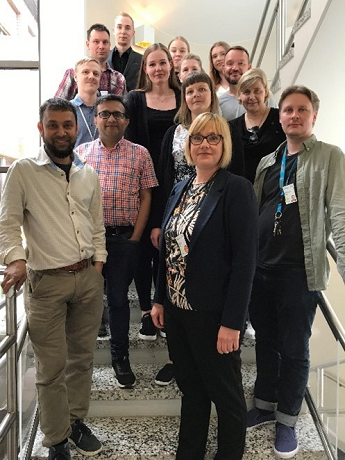
Picture. WastPan consortium visiting THL's Kuopio office. In the picture Rafiqul Hyder, Ananda Tiwari, Oskari Luomala, Anssi Lipponen, Aapo Juutinen, Anniina Sarekoski, Eevi Sipponen, Kirsi-Maarit Lehto, Annika Länsivaara, Sami Oikarinen, Anna-Maria Hokajärvi, Annamari Heikinheimo Aleksi Kolehmainen and Tarja Pitkänen.
On the second day, the WastPan consortium met in Kuopio's science park, where Technopolis's 7th Heaven meeting space provided a good setting to review the results obtained so far in the project's various work packages and plan for the future.
.png/c5c9acc5-71a6-45d3-2c6a-e88083405fbe?t=1663907673331)
Picture. The WastPan consortium in a joint picture above the roofs of Kuopio's science park on 21 June 2022: Aleksi Kolehmainen, Ananda Tiwari, Anssi Lipponen, Rafiqul Hyder, Annika Länsivaara, Eevi Sipponen, Aapo Juutinen, Tarja Pitkänen, Oskari Luomala, Sami Oikarinen, Kirsi-Maarit Lehto, Anna-Maria Hokajärvi and Annamari Heikinheimo. Photographer: Anniina Sarekoski.
The important goal of the Wastpan project's second research year is the development of a portal, for which the microbiological results obtained from the wastewater samples by the consortium sub-projects will be compiled in machine-readable format. This makes it possible to compare the wastewater results with the register data of infectious diseases and antibiotic resistance from the localities participating in the monitoring.
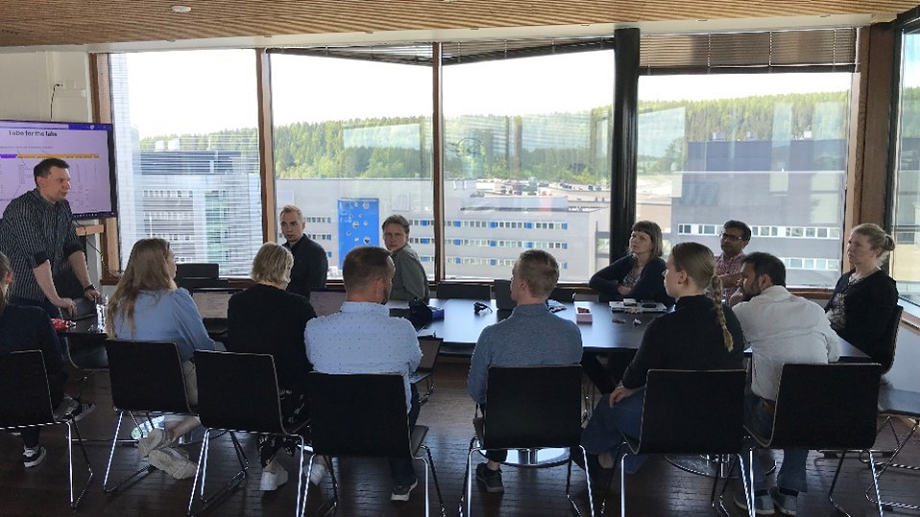
Picture. At the consortium meeting, Anssi Lipponen, the leader of work package 1. reminded the participates about the future project tasks. Anniina Sarekoski, Annika Länsivaara, Anna-Mari Heikinheimo, Aapo Juutinen, Sami Oikarinen, Aleksi Kolehmainen, Oskari Luomala, Anna-Maria Hokajärvi, Eevi Sipponen, Ananda Tiwari, Rafiqul Hyder, Kirsi-Maarit Lehto and outside the picture Tarja Pitkänen were listening carefully on-site and via Teams, Viivi Heljanko, Ahmad Al-Mustapha, Paula Kurittu and Kati Räisänen were also present at the meeting.
WastPan researchers in 2nd consortium meeting in December 2021
WastPan project has been running now for one year. The second consortium meeting was held on 16th of December in Teams. The program included presenting the workpackages, tasks and deliverables. In the afternoon, the participants worked in workshops discussing the experiences related to sampling and methodology as well as plans for the next year. Although the pandemic forced the meeting to be held in Teams, it did not prevent active discussions and warm spirit. Next year there will hopefully be a WastPan consortium meeting on-site!
.jpg/69e1b7f0-5860-aa04-eeaf-d110fedc8479?t=1681449809089)
Figure. Researchers in a Teams photo participating the consortium meeting on 16.12.2021:
Annamari Heikinheimo, Viivi Heljanko, Anna-Maria Hokajärvi, Rafiqul Hyder, Venla Johansson, Aleksi Kolehmainen, Paula Kurittu, Annika Laaksonen, Kirsi-Maarit Lehto, Anssi Lipponen, Annika Länsivaara, Sami Oikarinen, Tarja Pitkänen, Anniina Sarekoski and Ananda Tiwari.
WastPan project presented in 6th EU Town Hall meeting in November 2021
European Commission aims to develop wastewater-based surveillance for monitoring infectious diseases. During the pandemic, the focus has been especially in Sars-Cov-2 and it’s variants in different EU member states. Surveillance is coordinated by JRC, DG Environment and CG Sante, and different stakeholders from water and health sectors are invited to participate. Related to SARS-CoV-2-waste water surveillance, EU Commission has organized several “EU4S Town Hall” Webex meetings during the pandemic. The sixth Town Hall meeting was held in 23.-23.11.2021, and for the first time it was organized as a 2-day event. In the event, the current situation in SARS-CoV-2 wastewater surveillance was presented and the future was also discussed. Finnish WastPan researchers also got an opportunity to give a talk on the silent pandemic AMR, as the workpackage leader Annamari Heikinheimo presented WastPan AMR surveillance in an oral presentation. WastPan project was also presented in an ePoster which can be also found from Town Hall virtual exhibition: (https://my.ltb.io/#/showcase/jrc-sustainable-resources).
.jpg/d22a2039-5d0a-7cb0-5792-939434fbafd8?t=1681449875439)
Figure. WastPan -ePoster (Source: https://my.ltb.io/#/showcase/jrc-sustainable-resources, part ”Decision support”).
EU Sewage Sentinel System for SARS-CoV-2 (EU4S) – V Town Hall Meeting and e-Exhibition, EU SCIENCE HUB
The 5th Town Hall event on July 7, 2021 gathered a wide audience - 393 attendees! The WastPan project participated with ePoster in the eExhibition organized for the first time in connection with the Town Hall Meeting. Summary and Recordings of the 5th Town Hall are now online. Save-the-date for Town Hall VI, October 14, 2021!
WastPan stakeholder meetings with public health care actors (16 June 2021) and wastewater treatment plant representatives (18 June 2021)
The development of the pandemic early warning system is already well under way.
At the WastPan meeting held on 16 June 2021 with hospital districts and other public health care stakeholders, we presented the project and the preliminary research results it has obtained. Work was done before the meeting to assess participants’ awareness of wastewater monitoring and desires to support the development of this work. The well-attended event featured lively discussion and practical examples of how the system would best serve end users. There is a clear link, with relatively few exceptions, between the number of coronavirus cases diagnosed and the results of the SARS-CoV-2 coronavirus wastewater monitoring. The monitoring of wastewater was familiar to many participants, and many reported beforehand that they keep track in their work of the published results. The Finnish Institute for Health and Welfare website was considered suitable for this purpose, although targeted information and periodic press releases in e-mail form were also requested. The need to regionally communicate the results of the wastewater monitoring to the local population was also identified as an area for development. The utilisation of monitoring results in everyday public health care had remained at a low level, so special attention should be paid in the future to areas such as the presentation of the results and the communication channels used. The meeting has already led to increased cooperation between different actors in areas such as hospital sampling – research focusing on particular smaller areas is currently being planned!
On 18 June 2021, another stakeholder meeting between the WastPan project's wastewater monitoring implementers and the people taking care of the sampling at the wastewater treatment plants was held. The project was presented and the details of the project's practical measures, such as matters to be taken into account when collecting and sending dispatching composite wastewater samples at wastewater treatment plants were discussed. The representatives of the wastewater treatment plants were also given the opportunity to send questions in advance to the project implementers. No such questions were raised this time, so we concluded that the treatment plants already have a good understanding of the project and the requirements for sampling. At future events, we will continue to jointly plan how we can improve collaboration within the project and promote the usability of the results.
WastPan consortium’s spring meeting was held on World Water Day 22 March 2021
At the Wastewater-based surveillance as a pandemic preparedness tool (WastPan) project’s stakeholder meeting held in March, we presented the project and its preliminary research results. Meeting participants also discussed the challenges and possibilities related to the early warning system. What kind of system is it that we want to develop.
.jpg/1f9a7dde-7fc9-087c-f1fc-1c34b76b9311?t=1681449952649)
Photo: The consortium's sub-project is led by Assistant Professor Anna-Mari Heikinheimo, who spoke about the silent pandemic caused by antibiotic resistance.
At the consortium meeting, the Finnish Institute for Health and Welfare (THL), the University of Tampere (TAU) and the University of Helsinki (HY) presented the results gained over the first months of the WastPan project: the sampling plan, research locations, analysis methods and studied parameters, as well as the preliminary results of the sampling campaign carried out in February. After this, we discussed the properties of early warning system that should be developed in the project. The discussion was sped up by an advance task that had been given to participants on the desired properties of the wastewater-based system. A great deal of potential was seen in the system, but resources are also needed, e.g. for sampling at the wastewater treatment plants. The maintenance of the system must also be secured after the project comes to an end - this means both the wastewater sampling and analysis systems and the actual early warning system.
.jpg/6ae1f20b-0b02-26f1-eacc-9708f712c505?t=1681450003523)
Photo: Comments by participants on the desired properties of the wastewater-based early warning system were compiled on a Flinga board during the meeting.
In March, the European Commission also issued its recommendation on SARS-CoV-2 monitoring and variant sequencing. The evening of World Water Day culminated in the 4th Town Hall organised by the EU’s Umbrella Sentinel Sewer system where the EU Commission’s recommendations were discussed.
More information:
SARS-CoV-2 Monitoring employing Sewers - 4th Town Hall Meeting



